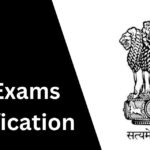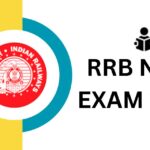UPSC 2024 Online Application:
The UPSC 2024 online application process begins with the release of the official notification. Filling out the UPSC online application form requires careful attention, as even a minor mistake may result in the rejection of the candidature.
The online UPSC application registration process comprises two parts:
- Part 1: Basic details such as name, age, address, etc.
- Part 2: Selection of the UPSC exam centre, payment of fees, and uploading the photo, signature, and ID proof.
Candidates can find detailed information on the UPSC online application process in the linked article.
UPSC Application Fee:
Candidates need to pay a fee of Rs. 100/- for the UPSC online application, either by depositing the money in any Branch of the State Bank of India by cash, or using the Net Banking facility of any bank, or using Visa/Master/RuPay/Credit/Debit Card/UPI Payment. Female/SC/ST/Persons with Benchmark Disability candidates are exempted from fee payment.
UPSC Exam Pattern:
The UPSC exam comprises three stages: Preliminary examination, Main examination, and Personality Test.
- UPSC Prelims: Objective type test with General Studies Paper I and Civil Services Aptitude Test (CSAT) as Paper II.
- UPSC Mains: Subjective type test with nine papers, including an Essay paper, four General Studies papers, two optional papers, and two language papers.
- UPSC Interview: Personality Test conducted for candidates who qualify in the Main examination. This assesses a candidate’s personality, behaviour, response to situations, knowledge, mental alertness, critical powers, and other aspects.
Candidates selected in the interview proceed to attend training for different posts and services based on preferences and ranks.
The exam pattern for UPSC 2024 Prelims is as follows:
| UPSC Exam Pattern – Prelims |
| Paper |
Type |
No. of questions |
UPSC Total Marks |
Duration |
Negative marks |
| General Studies I |
Objective |
100 |
200 |
2 hours |
Yes |
| General Studies II (CSAT) |
Objective |
80 |
200 |
2 hours |
Yes |
| Total Marks |
400 marks (with GS Paper II being of a qualifying nature, requiring a minimum qualifying score set at 33%). |
| UPSC Exam Pattern – Mains |
| Paper |
Subject |
Duration |
IAS Total marks |
| Paper A |
Compulsory Indian language |
3 hours |
300 |
| Paper B |
English |
3 hours |
300 |
| Paper I |
Essay |
3 hours |
250 |
| Paper II |
General Studies I |
3 hours |
250 |
| Paper III |
General Studies II |
3 hours |
250 |
| Paper IV |
General Studies III |
3 hours |
250 |
| Paper V |
General Studies IV |
3 hours |
250 |
| Paper VI |
Optional I |
3 hours |
250 |
| Paper VII |
Optional II |
3 hours |
250 |
UPSC Interview – The UPSC interview holds a weightage of 275 marks, contributing to a total of 2025 marks for UPSC Mains and Interview in the merit list.
For more detailed information on the UPSC exam pattern, refer to the linked article.
UPSC Syllabus The UPSC syllabus is vast and comprehensive, covering various topics for Prelims and Mains.
UPSC Prelims Syllabus
The UPSC Prelims syllabus includes two major subjects:
- General Studies
- CSAT
The General Studies paper of UPSC Prelims carries 200 marks and covers topics related to Indian Polity, Geography, History, Indian Economy, Science and Technology, Environment and Ecology, and International Relations.
The CSAT paper, also of 200 marks, includes Reasoning and Analytical, Reading Comprehension, and Decision Making questions.
For detailed topics in the UPSC syllabus for Prelims, check the linked article.
UPSC Mains Syllabus
The UPSC IAS Mains exam consists of 9 theory papers, with the marks of 7 papers considered for the final merit list. The other two papers, English and Indian Language, are qualifying in nature.
The important topics in the UPSC IAS Mains syllabus include:
- Compulsory Indian Language – paper A
- Paper B – English
- Essay
- General Studies I – Indian Heritage & Culture, History & Geography of the World & Society
- General Studies II – Governance, Constitution, Welfare Initiatives, Social Justice & International Relations
- General Studies III – Technology, Economic Development, Agriculture, Biodiversity, Security & Disaster Management
- General Studies IV – Ethics, Integrity & Aptitude
- Optional Subject – Paper I
- Optional Subject – Paper II
For detailed information, download the UPSC Mains syllabus from the linked article.
UPSC 2024 Admit Card Candidates appearing for UPSC 2024 will receive an e-admit card three weeks before the exam. It contains details such as the candidate’s name, roll number, photograph, venue, timings, subjects, and important instructions. Candidates should ensure accuracy and report any discrepancies to the Commission immediately.
Steps to download UPSC e-admit card:
- Visit the official website.
- Click on the e-Admit Card link.
- Select e-Admit Cards for various UPSC exams.
- Enter the Roll number or Registration number.
- Download the admit card and print a copy for the exam venue.
UPSC 2024 Exam Preparation
As the UPSC 2024 exam is highly competitive, early preparation is crucial. Candidates should understand the exam pattern, syllabus, and build their knowledge base. Regular practice, revision, and the use of online coaching or study resources are recommended.
Key preparation strategies:
- Understand the marking scheme, exam pattern, and syllabus.
- Tailor preparation strategies for Prelims, Mains, and Interview.
- Stay updated on current affairs for Prelims.
- Develop an in-depth understanding of Mains topics.
- Refer to quality study material and make organized notes.
- Read newspapers daily to stay informed about current affairs.
For a comprehensive guide on UPSC exam preparation, check the linked article.
UPSC books
UPSC exam syllabus is vast in nature and requires a lot of resourceful study material for preparation. However, NCERT books are one of the sought-after resources for UPSC Exam preparation due to how the concepts are explained, making it easier to grasp the basics.
The list of important UPSC books is as follows:
UPSC Prelims Books
| Subject |
Books |
| History |
- India’s Struggle for Independence – Bipan Chandra
- Indian Art and Culture by Nitin Singhania
|
| Geography |
- Certificate Physical Geography – G C Leong
- World Atlas (Orient Black Swan)
|
| Indian Polity |
- Indian Polity – M Laxmikanth
|
| Economics |
- Indian Economy by Nitin Singhania
- Economic Development & Policies in India – Jain & Ohri
|
| International Relations |
- Current Affairs
|
| CSAT |
- Tata McGraw Hill CSAT Manual
- Verbal & Non-Verbal Reasoning – R S Aggarwal
|
UPSC Mains Books
| Subject |
UPSC Books |
| History, Indian Heritage & Culture[GS Paper 1] |
- Indian Art and Culture by Nitin Singhania
- India’s Struggle for Independence by Bipan Chandra
|
| Geography[GS Paper 1] |
- Geography of India by Majid Husain
- World Geography by Majid Husain
- Fundamentals of Physical Geography NCERT Class 11
|
| Polity & International Relations[GS Paper 2] |
- Indian Polity by M. Laxmikanth
- Introduction to the Constitution of India by DD Basu
- International Relations: Pushpesh Pant
|
| Economy[GS Paper 3] |
- Indian Economy – Nitin Singhania
- Environment and Disaster Management – Tata McGraw Hill
- Challenges to Internal Security of India – Ashok Kumar
|
| Ethics[GS Paper 4] |
- Ethics, Integrity and Aptitude for Civil Services Main Examination by Subba Rao and P.N. Roy Chaudhary
|
The UPSC exam syllabus is extensive and demands resourceful study materials for effective preparation. Among the various resources, NCERT books are highly recommended for UPSC Exam preparation. Their clear and concise explanations of concepts make it easier for candidates to understand the fundamentals.
FAQs about UPSC 2024 Exam:
Q1: When is the UPSC 2024 Civil Services exam scheduled?
A: The UPSC 2024 Exam calendar was revealed on May 10, 2023. The Prelims exam is set for May 26, 2024, and the Mains exam will kick off on September 20.
Q2: Can I change the birthdate I already put in the online application?
A: Nope, you can’t change the birthdate once you’ve submitted it. UPSC doesn’t allow modifying this info, and providing incorrect details can lead to rejection.
Q3: When will I get the UPSC 2024 exam admit card?
A: About three weeks before the exam, you can download your UPSC 2024 e-admit card. Keep an eye on the official website for details.
Q4: Can I ask to change my exam center?
A: Sorry, UPSC doesn’t accept requests to change exam centers.
Q5: How are roll numbers and venues assigned to candidates?
A: The computer randomly assigns roll numbers and venues to eligible candidates without human interference. The Commission follows a “first-apply-first allot” basis to give preferred venues, but they can change it if needed.








